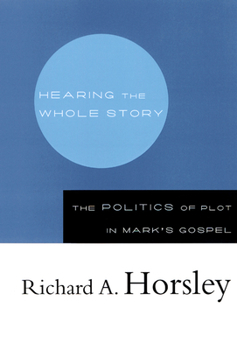Hearing the Whole Story: The Politics of Plot in Mark's Gospel
Select Format
Select Condition 
Book Overview
Richard Horsley provides a sure guide for first time readers of Mark's Gospel and, at the very same time, induces those more familiar with Mark to take a fresh look at this Gospel. From tracing the plot and sub-plot in Mark to exploring how the Gospel was first heard (as oral performance), Horsely tackles old questions from new angles. Horsely consistently and judiciously uses sociological categories and method to help readers see how Mark's Jesus challenged the dominant order of his day.
Format:Paperback
Language:English
ISBN:0664222757
ISBN13:9780664222758
Release Date:May 2001
Publisher:Westminster John Knox Press
Length:312 Pages
Weight:1.15 lbs.
Dimensions:0.9" x 6.1" x 9.0"
Customer Reviews
1 rating
Excellent book on postcolonial criticism
Published by Thriftbooks.com User , 14 years ago
This is a book review I wrote for a class over this book. I really enjoyed reading it and this book definitely makes you reexamine your understanding of Jesus and the first century. Horsley demands a new investigation in the Markan text is required due to the abuse of "modern literary analysis and Christian theological concepts." Mark has suffered from the hands of these dissectors as they savage their way through chunks of verses, establishing their own individualistic agendas, all while ignoring the oral, social, and political concepts of Markan text. Mark must be placed within its correct context of a story full of conflicts describing the historical interaction of the Galilean and Judean villages under Roman imperial rule. The dominant plot of Mark centers on Jesus "proclaiming the kingdom of God and manifesting God's renewing power for the people in exorcisms and healings." Secondly, there is a mandate for the disciples of Jesus to take this message and apply it to both the political and economic life of the village. The first chapter sets forth the apologetic of understanding Mark as a whole story. The Western reader, diagnosed with individualistic interpretation and plagued by mini-sermons that chop up and allegorize selected chapters, is urged to gain a historical understanding of the situations of the Markan text. Mark is a story that takes place in the villages of a third world country that details the struggle between the ruling elite and those being dominated. All the subplots within the text point toward the general agenda of a renewal movement amongst Israel's villages under the rule of Jerusalem leaders and Roman imperialism. In the next chapter, Horsley continues his thesis that the Markan text represents a story regarding the renewal movement of people subjected by the Roman Empire. In order to understand this rejuvenation, an investigation into the submerged history of the persons during the Roman occupation is needed. The historical perspective of history is usually viewed through the eyes of the winners and those in power. However, Mark, when compared to its historical and social elements, must be viewed as history from the bottom up. The village life, which in some form was autonomous through community rule, faced heavy taxation from Herod. The High Priests were granted authority only by Herodians rule and collaboration with the Empire. Thus, the priests poisoned the message of God with the venom of the Empire. Jesus, rejecting this form of empiric power, began his kingdom movement through village to village movement consisting of healings and exorcisms. The third chapter discusses the oral nature of the Markan text. It primarily sets the stage of literacy in the developing Galilean villages. Peasant workers, who were illiterate and whose villages most likely could not afford the expensive parchment scrolls, relied on oral tradition for their education of the Torah and teachings of Jesus. Horsley continues to ec





